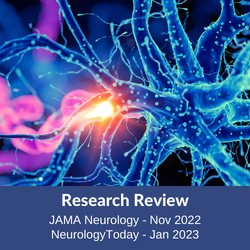Autoimmune Encephalitis Often Is Misdiagnosed, Even at Specialty Centers – What to Do to Get It Right
February 27, 2023

Dr. Eoin Flanagan from the Mayo Clinic in Rochester, Minnesota and colleagues from multiple institutions have published this article demonstrating that more than one in five patients diagnosed with autoimmune encephalitis (AE) were misdiagnosed and that about half of these patients actually had a primary behavioral or psychiatric disorder. Red flags associated with receiving the wrong diagnosis included a slow onset of symptoms, positive test in the blood of a nonspecific antibody, and failure to meet AE diagnostic criteria. The authors raise concern that misdiagnosis may lead to complications from unnecessary use of immunotherapies and delayed treatment of the correct, underlying diagnosis.
While increased recognition of AE globally has improved the detection of patients with AE, we are now seeing more children and adults given a presumed diagnosis of AE, without meeting criteria that show signs of brain inflammation or autoimmunity. These patients may actually have signs and symptoms that are consistent with other non-autoimmune conditions including neurodevelopmental disorders, genetic conditions, neurodegenerative disorders, behavioral disorders, and primary psychiatric disorders. It is important to recognize that similar to many medical conditions, including AE or other autoimmune conditions, there is often a spectrum of severity, and having “more severe” autism, epilepsy, anxiety, depression, or OCD, does not in itself indicate that the condition is autoimmune.
We are at a challenging point now where we need to balance considering autoimmune brain disease in children and adults with acute onset neurologic and psychiatric symptoms, but not to limit our differential diagnosis or evaluations. Similar to the concerns for missing a diagnosis of AE, misdiagnosing one of these other conditions as AE and starting therapy can actually detract from obtaining an accurate diagnosis and optimal treatments. Both physicians and families need to be open to the possibility of an alternative diagnosis, including less common presentations of common condition, and not assume that a patient has an autoimmune process when the presentation and evaluation are not consistent.
The ultimate goal is to reduce the suffering in those with neuropsychiatric symptoms, whether the cause is autoimmune, genetic or psychiatric. All are equally worthy of society’s attention, compassion, and pursuit of optimal therapy.
Thank you to Anusha Yeshokumar, MD and Heather Van Mater, MD for providing this Research Review.